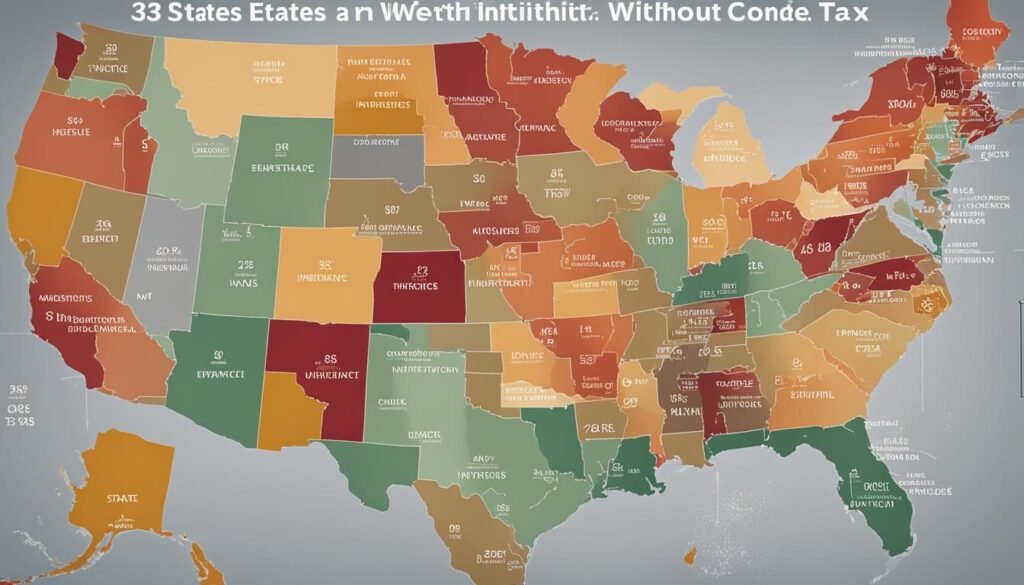
33 States Without Estate Tax
Did you know that 33 states in the US don’t have an estate tax? Yes, over half of the country doesn’t tax your estate. This can help protect your wealth or cut down on taxes. Knowing which states don’t have this tax is key for your money plans.
We’ll look at the 33 states without estate tax in this article. You’ll learn the perks of living in these tax-free places. We’ll cover how federal and state estate taxes differ too. This will give you a clear view on how taxes affect your wealth. Plus, we’ll mention the top states for arranging your estate and their benefits.
If you’re looking at tax cuts, planning your inheritance, or want a tax-friendly place for your estate, this article is for you. You’ll get all the info to choose wisely. Ready to dive in?
Key Takeaways:
- 33 states in the United States do not have an estate tax, providing tax benefits for your estate planning.
- Understanding the differences between federal estate tax and state estate tax is crucial for effective financial planning.
- Choosing a tax-free state for your estate can offer advantages such as tax breaks and tax-friendly environments for your assets and retirement distributions.
- State taxes, including state income tax and property tax, can significantly impact your real estate assets and inheritance.
Understanding Estate Tax: Federal vs. State Differences
Understanding estate tax is key in estate planning. It’s a tax on someone’s assets after they pass away. Basically it’s a death tax, you’d think you could die and not be taxed. Different rules apply for the federal government and individual states. Let’s start with the definition of Estate Tax.
What is Estate Tax?
Estate tax can come from the federal or state government or both. It affects assets like real estate, cash, and more. The goal is to collect money and spread wealth.
Estate tax, often referred to as inheritance tax, is a levy imposed on the assets, including money, property, and investments, that a person leaves behind after their death. This tax is calculated based on the total value of the deceased individual’s estate and is paid by the estate before any distributions are made to beneficiaries.
The purpose of estate tax is to generate revenue for the government and to prevent the accumulation of wealth within a few families by imposing a tax on the transfer of large estates. Each jurisdiction may have its own thresholds and exemptions for estate tax, and it’s essential for individuals to understand their obligations and plan accordingly to minimize the impact of this tax on their heirs.
Distinction Between Federal Estate Tax and State Estate Tax
Understanding the distinction between federal estate tax and state estate tax is crucial for effective estate planning. Federal estate tax is imposed by the U.S. government on the transfer of assets upon a person’s death. It applies to estates exceeding a certain threshold, which is set by federal law and subject to change.
In contrast, state estate tax is levied by individual states on top of federal estate tax, with each state having its own set of rules, exemptions, and thresholds. While some states adhere to the federal threshold, others set their own limits, potentially subjecting smaller estates to state estate tax. Moreover, some states may not impose estate tax at all or have repealed it entirely. Thus, individuals should be mindful of both federal and state estate tax laws to effectively plan their estates and minimize tax liabilities for their heirs.

The federal estate tax applies across the U.S. However, only 12 states and the District of Columbia have their own tax. These include Connecticut, Hawaii, and many others. In fact, Maryland charges both an estate tax and an inheritance tax. Wow!
Each state’s estate tax rules vary. Sometimes, you might pay state taxes even if you’re clear from federal taxes. The amount of tax you’ll pay in each state is also different. For example, Maine and the District of Columbia charge 12%, where Hawaii and Washington state charge 20%.
Estate Tax and Inheritance Tax: Are they the same?
Often times these two terms are used incorrectly so let’s clear it up right now. Distinguishing between estate tax and inheritance tax is essential for anyone navigating the complexities of estate planning. Estate tax is levied on the total value of a deceased person’s estate before it is distributed to heirs, and it’s paid by the estate itself.
In contrast, inheritance tax is imposed on the assets received by individual beneficiaries after the estate has been distributed, based on their relationship to the deceased and the value of the inheritance. While estate tax impacts the estate as a whole, inheritance tax affects the heirs directly.
The individuals affected by these taxes vary depending on the jurisdiction’s laws and the size of the estate or inheritance. Understanding these differences is crucial for effective estate planning to mitigate tax liabilities and ensure the smooth transfer of assets to beneficiaries.

List of 33 States Without Estate Tax
We will list all 33 states in the U.S. that don’t have an estate tax here. Living in these states can be a big plus for estate planning. Knowing which states do not have this tax helps you plan and manage your estate better. Let’s see why these tax-free states are great.
Here’s a table showing the 33 states without an estate tax:
| Alabama | Alaska | Arizona |
| Arkansas | California | Colorado |
| Delaware | Florida | Georgia |
| Idaho | Indiana | Kansas |
| Louisiana | Michigan | Mississippi |
| Missouri | Montana | Nevada |
| New Hampshire | New Mexico | North Carolina |
| North Dakota | Ohio | Oklahoma |
| South Carolina | South Dakota | Tennessee |
| Texas | Utah | Virginia |
| West Virginia | Wisconsin | Wyoming |
Living in these states brings several perks, such as:
- Passing on more of your estate for your heirs.
- Avoiding hard calculations and tax issues with estate tax.
- Making wealth transfer to the next generation smoother.
- Having more ways to plan your estate.
- Being able to gift money and donate to charity more tax-efficiently.
Remember, these states might not have estate tax, but they could have other taxes like income or property tax. It’s key to look at all taxes and talk with a tax expert or estate planner. This will ensure you follow the laws and use tax benefits well.
Use this list of states without estate tax as a guide to consider your estate planning options. Think about the pros and cons of living in these tax-free states. Then, you can make an estate plan that fits your goals.
Assessing the Impact on Inheritance and Estate Planning
Being in a state with no estate tax helps your inheritance planning. You can decide better how your assets are shared. More of your estate can go to the next generation.
It also makes estate planning simpler. You can focus more on setting up trusts and choosing beneficiaries. You’ve go the freedom to create a plan that meets your goals.
Overall, living in a tax-friendly state is very beneficial. You can use the tax breaks and planning options available. This helps you keep your wealth safe and plan better for the future.

Real Estate and Inheritance: How State Taxes Can Affect Your Assets
Understanding state taxes is key when dealing with real estate and inheritance. Taxes such as income and property tax can greatly affect your estate’s value. We’ll look into how these taxes impact your assets and discuss choosing locations with tax benefits.
Impact of State Income Tax and Property Tax on Estates
State income taxes differ and can affect your estate heavily. While some states tax all income types, others may not. Retirement income types can be social security, as well as distributions from pensions, IRA’s and other investment accounts. It’s vital to understand these tax rates when searching for the location of your retirement.
Property tax should also be considered. It’s based on your real estate’s assessed value. High property taxes can lower your estate’s worth, but more importantly it’s an annual expense that must be built into your retirement budget. If managed correctly this too can enhance the wealth passed onto your heirs.
Considering Real Estate Locations for Tax Advantages
Choosing a low-tax location for your real estate can offer perks. States with lower property taxes or exemptions can boost your estate’s value. This helps reduce tax burdens significantly.
It’s also crucial to look at a state’s overall tax scene. Living in a no-income-tax state can save a lot of money, especially if you have substantial real estate assets. Picking a tax-friendly state for residency can greatly benefit your estate’s planning.
Below I have highlighted four states that could be great options for a friendly tax environment. All of these state do not collect state income tax or tax social security, three of them do not collect taxes on your investment distributions.
| State | State Income Tax Rate | Property Tax Rate | Tax Advantages |
|---|---|---|---|
| Nevada | No State Income Tax | .55% | No tax on retirement income |
| Texas | No State Income Tax | 1.6% | No tax on retirement income |
| Florida | No State Income Tax | .91% on avg. | No tax on retirement income |
| Washington | No State Income Tax | 1% cap + special | No tax on Social Security |
This table gives a clear comparison of tax rates in different states. You can see the benefits in states like Texas and Florida. They offer advantages like no state income tax and lower property taxes. However, Nevada is the best deal but it’s important to note, they have a higher than average sales tax.
By knowing how state taxes impact your estate, you can make smarter choices. For the best outcome, consider talking to a tax expert or estate planner. They can help you use tax benefits to safeguard your assets for the next generation.
Conclusion
Understanding estate tax and planning your estate are key steps for your financial future. Living in one of the 33 states with no estate tax means less impact on your assets. This means your loved ones could receive a bigger inheritance.
We’ve looked at how estate taxes work, including the differences between federal and state taxes. We’ve also listed states with no estate tax, showing the perks of living there. This helps in choosing the best state for your financial health.
Choosing states with no estate tax leads to big savings and better estate planning. These states help you pass on more to your loved ones. There’s a variety in exemptions across states, offering great benefits in planning.
To sum up, living in a state without estate tax matters a lot for your estate. It helps keep more of your assets safe for your family. For the best results, get advice from a financial expert or estate planner. They can guide you through estate tax details to maximize your benefits.







